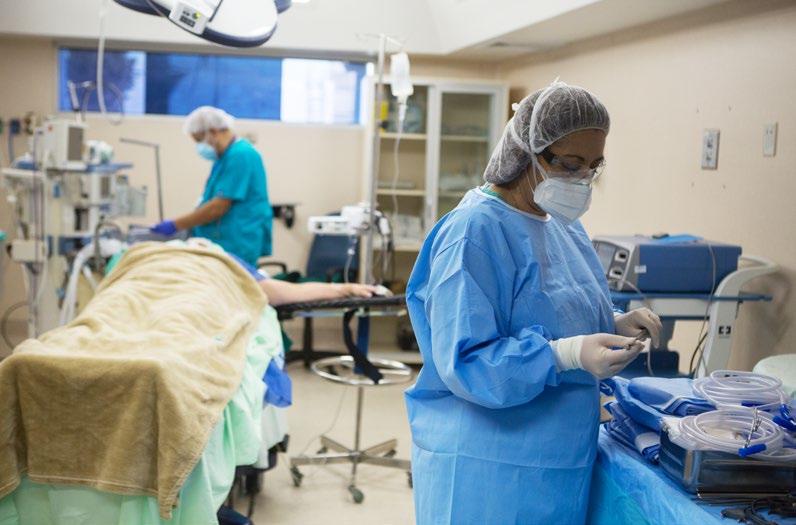
4 minute read
Love is what keeps us going
judith aguilera Head of Nursing, Intensive Care Unit Bupa Antofagasta Hospital
I am the head nurse in the critical patient unit. I have worked as a nurse for twenty-five years, all of them in intensive care at the Bupa Antofagasta Hospital. My unit is made up of three sub-units that were basically one ICU and two high dependancy units, but with Covid they were made into three intensive care units plus one high dependancy unit, and we increased our beds by 100%. We made the change beetween March and part of April, and the healthcare team were always very willing to cooperate in everything they could in terms of the pandemic. A lot of them actually helped with the changes right from the start. Although not many have got sick in the Covid team, we had to take on more people because of the changes and because of other health problems people started getting because of the heavy workload:
aches and pains, backache and shoulder-ache (rotator cuff), because of moving patients, especially sedated patients, who are very heavy. We had to organise training, induction and specialised emotional support for our new colleagues. That involved the older ones too, people who had been working 30 or 35 years in intensive care, who had to be retrained and find the right balance. On the whole, we hadn’t had many deaths, but now they had gone up and that worried us. The toughest moment was at the peak of the pandemic. That actually came quite late for us. We had expected it in June and July, but it came in July and August. During those months, the healthcare teams were tired, not just physically but also emotionally, because everything feels worse when someone close to you gets sick, which was what happened to a colleague of ours who was about 47 or 48 years old. It was not easy to care for him when he was so ill. I think it was the toughest moment for all of us. He is an auxiliary nurse in uci and has been at the clinic for twenty-five years, the same as me. In fact, we started at almost the same time. He was very unwell, lying face down on mechanical ventilation and on a lot of medication. Our teams did everything to help him. Recently, at the beginning of August, we could extubate him. When we finally discharged him, it was a moment of great happiness and hope for us all. It is very important to see each person in our team as an individual, with their own world, their own family, their own concerns and needs. Sometimes all you need is someone to come up to you and tap you on the shoulder and ask you: How are you? 98% of us here are women, young adults mainly, with children aged between two and five years old. You can’t help but feel sorry for many of them. Many of them have decided to leave their children in other towns with family and live on their own. Others have left their partners in charge of the children. The families are very supportive. I am the mother of two children, Gabriel aged 9 and Tomás, the oldest, who is 14 years old. I get home about eight at night every day and go through a whole disinfection procedure, and it is only after that that we hug and talk. That’s when we share our days. By ten at night I am exhausted. I think it’s my family’s love that has kept me going. Without my husband’s support I couldn’t have done it with the children. At this point, we both work the same amount. My husband doesn’t work in healthcare, but he met me some years ago when he was working as an intensive care nurse and thankfully understands my work. His name is Patricio. He had Covid and pneumonia at the start of the pandemic and I
ANTOFAGASTA — CHILE
have to say, the physical consequences are terrible – a person is never the same afterwards. He is 42 years old, really sporty, has played rugby his whole life, but his fitness has changed. He is more tired, less energetic, wants to sleep more and is even more irritable. He was at home with us the whole time. They found he had the virus because he started with renal colic. We will never know who infected who. The children and I were asymptomatic. The emotional side is the worst. We were just talking about that last night. I asked him how he was and he said he was fine. You don’t look fine, I said, you look different. He paused for a moment, looked at me and said: In September I will go back to training. As a nurse, I have to put others before myself, because our profession is about caring for people, whether it’s to cure them or be there when they die. Although I have worked for twenty-five years, I still feel it when someone dies. I think you have to be calm and remember you have done your best. People are more than just a body, they are a soul too and the legacy they leave is more important than their body. �








